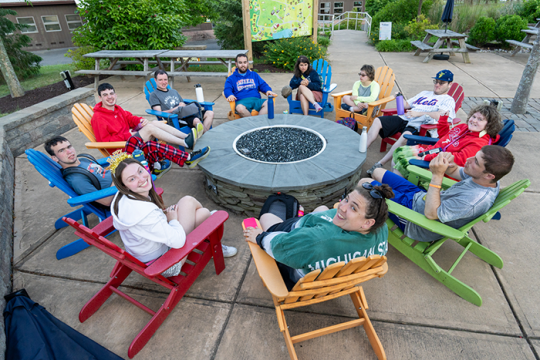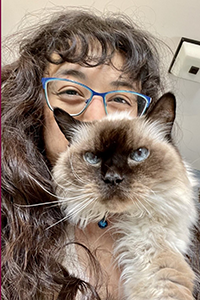
My Hebrew name is Emunah. Emunah is most often translated into English as "faith" or "belief," but its meaning is closer to the word "trust." When the word first appears in the Torah, in the story of Abraham's encounter with God, the verse says, "and he [Abraham] put his trust in Adonai" (Genesis 15:6). Emunah also shares a root with the word "amen," said to acknowledge a prayer or blessing.
My Hebrew name is Emunah, and I have autism spectrum disorder (ASD).
With autism, the brain is wired differently and is often programmed differently from a "neurotypical" brain. Some defining characteristics of autism include: difficulties in communication and social interaction, restricted and repetitive behavior, sensory processing issues, and difficulties with emotional and physiological regulation. Autism is a spectrum and the combination of defining traits manifests differently in each individual.
Because autism is not an illness, there is no need for a cure. However, support, accommodations, and methods to manage the challenges that can come with autism are essential. In his book, "Uniquely Human," Dr. Barry Prizant asserts, "For the vast majority of people on the spectrum, autism can be best understood as a disability of trust. Because of their neurological challenges, people with autism face tremendous obstacles of three kinds: trusting their body, trusting the world around them, and... trusting other people." Many of us with ASD live in a near-constant state of hypervigilance, meaning our brains are always on alert for danger. This often results in the fight-flight-flee-fawn response.
In Exodus, the Israelites respond to Moses being on Mt. Sinai for 40 days similarly to the way one on the autism spectrum might react. The Israelites were not only traumatized from being slaves themselves, as the biblical tale goes; they were also carrying generational trauma and were living in a state of hypervigilance. Both traumatized individuals and those with ASD often prefer the familiar, no matter how unpleasant, over the unknown.
When Moses did not return from Mount Sinai at the time that he said he would, the Israelites became overwhelmed by the thought that they had been abandoned. In their desperation to cope, they asked Aaron to build them a god. The Israelites, seeking a way to feel safe, reverted to the familiar by building an Egyptian-style relic, a golden calf, to represent God. Surely, Aaron and others among them must have known that this was a clear violation of God's teachings, but perhaps Aaron also knew that the people waiting at the base of the mountain needed a coping mechanism; perhaps they were just trying to survive.
I empathize with them. I know what it's like to manage fear in unproductive ways. This isn't because I want to harm or upset anyone. Extreme fear reduces the functioning of the part of the brain responsible for speech, logic, and higher thinking skills, leaving the brain to rely solely on instinct.
The Israelites may have resorted to unhealthy regulation in this instance, but I think they were trying to find emunah -- something they could trust, since they believed that Moses had abandoned them. Whether one is neurotypical or autistic, spirituality can provide amazing comfort.
When Moses came down from the mountain, he saw what had happened with the Israelites and, in a burst of anger, shattered the tablets.
As a person with ASD, I can deeply relate to both the Israelites and Moses in this episode. There have been times when my autism, illnesses, and the dumpster fire the world is becoming have all left me in despair. Like the Israelites, I've sometimes responded in harmful ways. There have been times when the people I've counted on and trusted lost their cool and, like Moses, shattered the tablets of my trust.
Despite my desire to do good, my actions caused immense stress to my loved ones. The guilt and shame I felt was crushing, but I know I never meant to cause harm. This is why I must believe that trauma and hypervigilance were what led to negative results.
But neither of our stories end there.
After shattering the tablets, Moses appealed to God. God decided to spare the lives of the Israelites but needed to take a break from being in their presence to allow for a reset. This time, the people needed to trust that God and Moses would stay with them.
I don't know what my future holds, but I do know that, like the Israelites, I will have crises of trust; like the Israelites, I will make mistakes. Autism advocate Michael John Carly has said, "the opposite of anxiety isn't calm; it's trust." I have to trust that God and my loved ones will forgive me. I am doing my best to live up to my name, Emunah, guided by faith and acting on trust.
Ultimately, after many trials and tribulations, the Israelites develop emunah, faith in God and in themselves, which enables them to reach the Promised Land. God and Moses find ways to forgive and stick with the struggling Israelites, despite their missteps. Regardless of whether a person is neurotypical or neurodiverse, may we all be able to find emunah to help us as we face our fears. When we can support a loved one, may our emunah give us the fortitude and patience to say, "I may need a break, but I'm still with you." Then we can reach our Promised Land together.
Related Posts

From S'mores to Skills: Building Futures at Camp

Creating A Workplace of Belonging

